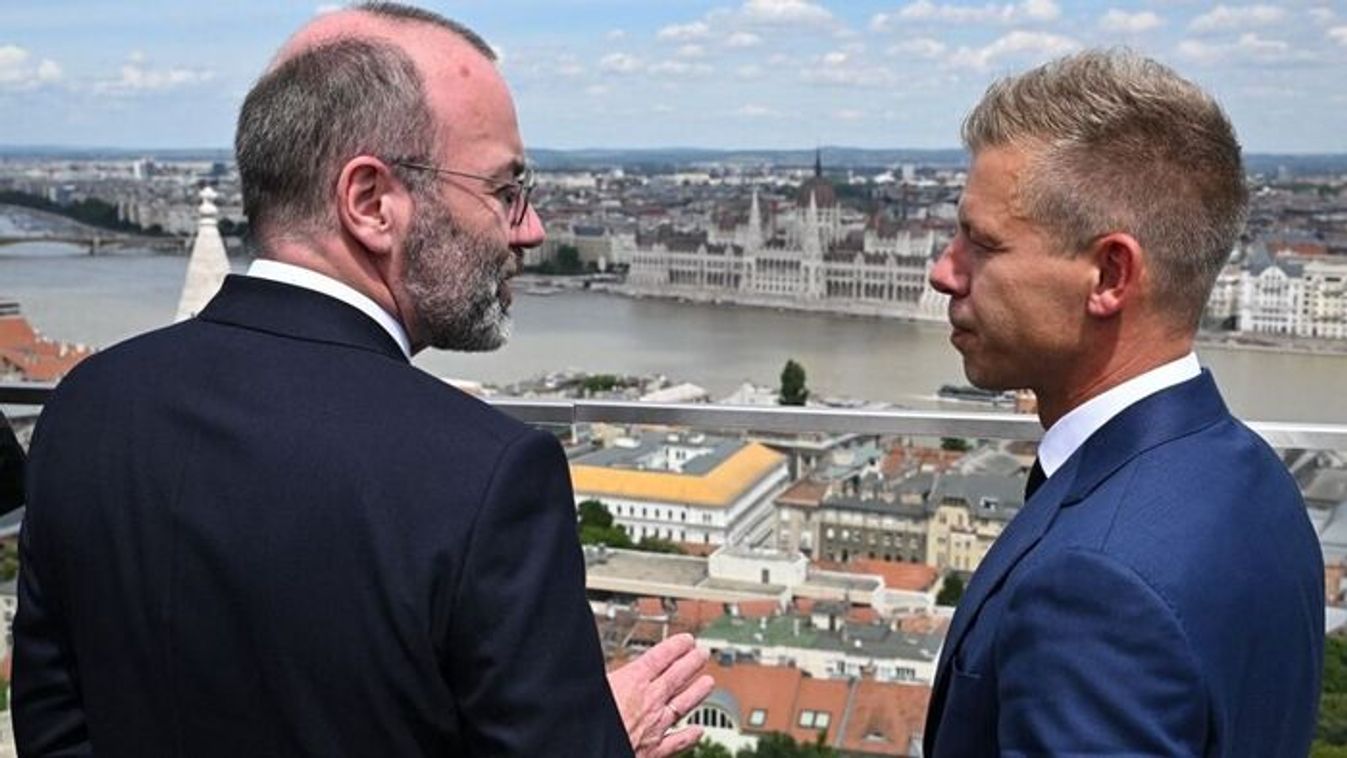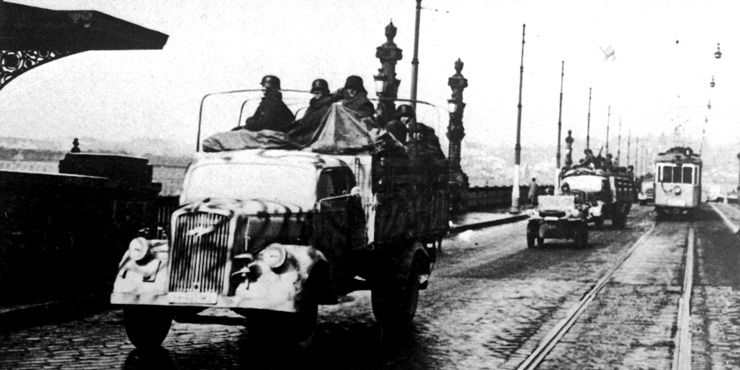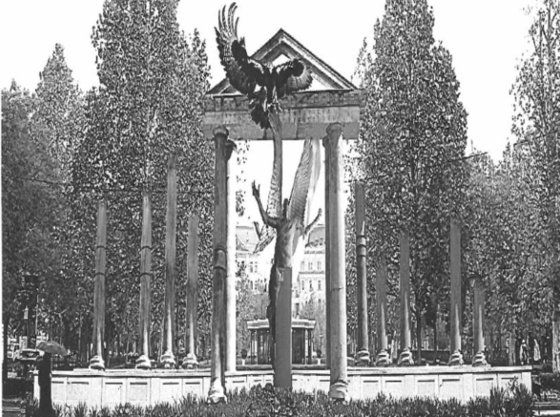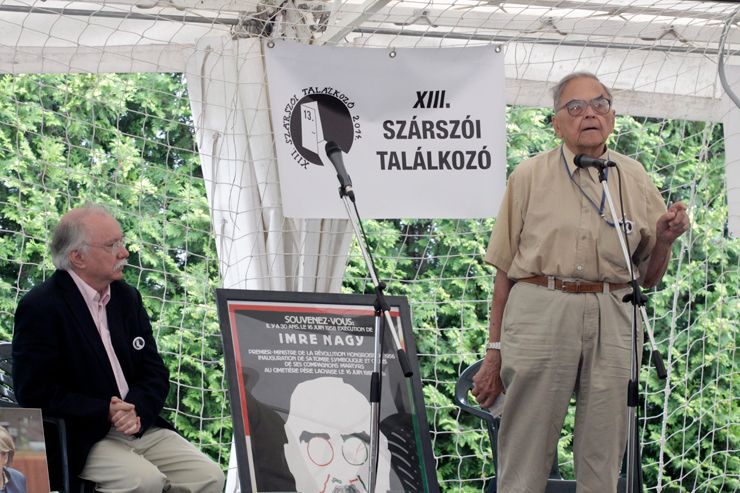Ez is napvilágot látott: Magyar Péter tudhatta, milyen bosszút forralnak Magyarország ellen

A szakértő szerint közölték a Tisza Párt elnökével, mi a feltétele a hivatalban maradásának.

In contrast to the left-liberal fringe, the significant majority of the Hungarian electorate expects representation of the Hungarian national interest and demands it from its elected leaders.
This article was adapted from the original, which appeared in Hungarian at Válasz.hu
*

“The tragedy of the Jewry has become the tragedy of the nation.”
György Ránki
Following the 2014 elections, the decades-long influence and intellectual terror of the left-liberal opinion leaders are slowly vanishing. The emblematic figures of the left-liberal team controlled the narrative for decades and ordained themselves responsible for deciding who was presentable and who was not, who would be celebrated – or even who must be celebrated – and who would not. Well, until this spring, that is. Since then, those who could do no wrong have finally lost the few bits of respect they had managed to maintain.
The left-liberal coalition that came to be known as “unity for change of government,” a self-imposed alliance, resulted in a spectacular failure and further proof that the “smart ones” got it wrong. They are not only failing to understand the 21st century, but have, once and for all, locked themselves in the ideology and values of the ‘68-ers, a world that expired long ago. They forced an unprincipled compromise on what at the time still seemed to be a viable party, the Hungarian Socialists, and thereby made impossible its hopes for renewal. This circle of intellectuals, who are completely unaccountable, repeatedly attacked and shamed the Socialist leader, Attila Mesterházy and other MSZP politicians who sought an opportunity to open up to the world outside their narrow circle of values and interests.
Some of the younger Socialists recognized that the path that Viktor Orbán followed over the past 25 years has lessons to offer them, too. They observed how Orbán, following the 2002 defeat, reorganized Fidesz and made it into a hard-hitting party. They learned from the organizational and technical masterstrokes of the Orbán-led transformation. But they have not fully grasped that the emotional appeal – based on a particular mindset and core values – is the soul of this well-functioning political power. Mesterházy realized that the advantage his party once enjoyed, that of being the post-communist successor party, is gone, and what little remains is too little to keep MSZP a defining political power in the 21st century.
The left-liberal intellectual and media elite, however, never got that far. They do not understand that the new century began in 2008, bringing a different balance of power, a different set of questions, different conflicts. And for these we have to find new answers. Instead, they continue to try to win the debates of the last century, ignoring the lessons that the past offers for today’s challenges. The past, however, offers guidance for the present and future only if we are able to study it without bias and prejudice. The left-liberal intellectual circle, those who devised the politically correct narrative and based their political power on it, is incapable of such study.
They cannot accept that alternative interpretations and understandings could be just as legitimate in a free society as theirs. They cannot accept that their narrative, once imposed upon society by the predominant power of a bygone era, no longer holds a privileged place. It’s about time to understand that history is not a religion. Nor can it be used, despite Marx’s promise, as a surrogate for religion. History is not equal to morality. The duty of the historian is to explain, to interpret, to understand and to help others understand. The historian is neither judge nor prosecutor nor attorney. The historian cannot project the ideological schemes of his age on the past and cannot observe the past’s narratives with today’s sensibilities. [1] A great example of this is the unholy and unproductive “debate” that has been going on for months around the memorial at Szabadság tér to the victims of the Nazi occupation that began in 1944. I will not comment on the actions aimed at getting media attention and, out of all of the objections, I would focus on the “contextual” ones. [2] I would prefer not to deal with the choice of location because what the United States Embassy has done to one of the most beautiful public squares in Budapest is going way too far. So those who refer to the aesthetic qualities of the square are more than a little hypocritical.

The Germans occupy Budapest
Conventional historical wisdom says Hungary was an ally to the Third Reich and, therefore, the Nazis didn’t really invade and occupy us. According to this line of thinking, we should call the Nazi invasion of March 19, 1944 “friendly support” similar to the Soviet army’s “support” of its Hungarian ally on November 4, 1956. This would be the very same Soviet army that “liberated” us in 1945 and ended up sticking around for about half a century. [3] Some even claim that Hungarians were happy with the occupation, receiving the Nazi troops with flowers and song. There is, to be fair, the faintest whiff of truth to this: the invading Red Army was joined by local collaborators. But the assertion that Hungarians in 1944, 1945 or 1956 were happy about a foreign invasion and occupation can only be made out of small-mindedness.
Another criticism is that the memorial mixes the perpetrators with the victims.[4] This holds that it is conceivable that someone actively involved in persecuting our Jewish compatriots later became a victim of the war. That’s the way war is, after all, right? It doesn’t spare the innocent and destroy the sinful. Every war memorial runs such a risk. On Szabadság tér, there is the Soviet heroes’ memorial, commemorating invading Soviet soldiers who raped more than a hundred thousand Hungarian women while pillaging and terrorizing the country. Of course, those with selective sensitivity have yet to organize a flashmob protest of that memorial.
Others point to the era’s legislative action. Those arguments hinge upon the idea that Hungarians weren’t “innocent” because their parliament passed numerous laws discriminating against our Jewish siblings – or even worse. In 1941, the government deported more than ten thousand citizens of Jewish origin who could not sufficiently verify their citizenship. As bad as these decisions were, they do not make the invasion and its consequences any less of a tragedy. [5] A victim is one who suffers the aggression of a stronger party. As with the ages before it, the twentieth century is rich in tragedies. Victims have become perpetrators more than once before. But recent decades have seen the victim’s status cemented into permanence. We are at a point where some groups would like to consider their ancestors’ tragic fate an inheritable and advantageous privilege. They would like this “victim status” to bleed to generations of those who suffered no harm. The implications of all this are profound. If the victim status becomes inheritable, so too does that of the perpetrator.
We survived two dictatorships. We are full of once-perpetrators and once-victims and their descendants. There are many, including my late grandmother, who died in World War II‘s bombings and the assaults. We don’t even know where their unmarked graves lie. Many Hungarian politicians and other public figures were imprisoned or killed not because of who they were, but because of their political views. [6] Is their martyrdom worth less? During the communist dictatorship, honoring them was out of the question.
Now, 70 years after the tragedy, those who developed the historic narrative of that dictatorship would still like to keep us from laying flowers of remembrance before every Hungarian victim of the Nazi occupation. They would still like to prescribe whom we can mourn and whom we can’t, for whom we can shed a tear and for whom we can’t. They prescribe empathy, then close their hearts, remaining deaf and blind to the pain of others. And so, because they act as if our national mourning can have no palliative effect on tragedies past, they exclude themselves from our national community.

Arguments against the memorial try to score identity points for the “democratic” side, which they portray as permanently forced into opposition and losing ground. By reheating the decades-old themes of “anti-Christianity” and “anti-Hungarianness,” Hungarian left-liberals rooted in Marxism and internationalism have become the longest lasting plums of the side promoting “transcendence of nations,” which even in Western-Europe is shrinking. [7] The angel motif, as a reflex, ignited a hate campaign in them, which only this atheist, extremely intolerant Marxist group is capable of doing.
Such accusations as relate to the memorial are insulting and unjust. [8] The proponents of these flawed ideas try to frame Hungarians more sinful and base than the Nazis. They deny the difference between murderer and abettor, suggesting that the Nazis somehow played a subservient role in the deportation and murder of our Jewish compatriots. That the real sinners were the Hungarians. [9] This, of course, ignores the historic facts and caters to the needs of the Germans and other foreign powers and the left-liberal’s penchant for sating them. [10]
“Up until the Nazi occupation, the lives of the almost one million-strong Hungarian Jewry, along with the ones seeking refuge here, were not endangered – everybody knew it back then and it was never denied by anyone except them. Despite Hungary self-critically owning up to responsibility, who would doubt that true responsibility lies mainly with German National Socialism, which eventually developed mass murder into a political program, planned it and executed it. Without all this, there would have been no Holocaust in Hungary,” György Ránki writes in his classic work. [11]
This jibes with the message of President Franklin Delano Roosevelt’s March 24, 1944 press conference: “As a result of the events of the last few days hundreds of thousands of Jews, who while living under persecution have at least found a haven from death in Hungary and the Balkans, are now threatened with annihilation as Hitler’s forces descend more heavily upon these lands.” [12]
Then there’s the letter from Otto Komoly, head of the Hungarian Zionist Federation, to the executing committee of the Jewish Agency. It was dated February 25, 1944: “Hungary, in extraordinary circumstances, one could say, shows heroic resistance against its largest neighbor and it only introduces the demanded anti-Jewish measures reluctantly and in a significantly decreased form. With this step-by-step delivery, the country was able to save the lives of three-quarters of a million Jewish compatriots.” [13]
Is it possible that these three men – the president of the United States, the leader of the Hungarian Zionists, and the Auschwitz-survivor and great historian of the period, György Ránki – all misjudged the role of the Nazis in destroying the Hungarian Jewry? It should come as no surprise that opponents of the memorial, in contrast to these men, refer to the self-extenuating testimonies of the most devious wrongdoers, Adolf Eichmann and Edmund Veesenmayer.
It’s important to talk it out
“The biggest obstacle in facing the past is that often we ourselves are afraid to face even the past of our own family,” says András Rényi, civic activist, who organized a protest group against the memorial entitled “Living memorial, my history.” Let’s look at his history, then. He might talk about what it was like to grow up in one of the most privileged families of the party state and the price his father paid to remain the permanent deputy editor-in-chief of the party’s Népszabadság (People’s Freedom). He might discuss how his mother served the constantly changing ideology of the party. What benefits did this bring him? Why did he join the state party at the age of 18? This is our mutual history. It is just as living but less discussed, though equally painful. Being open about these facts would also be an important step towards the living recollection he so sorely misses. Many of the protestors could – and should – speak out about the party-state pasts of themselves or their families. But they trust that if they talk ceaselessly about events 70 years past, they can avoid the discomfort.

The biggest problem of the left-liberal elite is that the phrase “Hungarian interest” is not comprehensible to them. Instead, with every fiber of their being, they define themselves as “forward-looking,” or “progressive,” and therefore more advanced than the merely national. They are, as such, greater than the nation, a cosmopolitan or internationalist group. Some of them don’t even notice that they have become servants to foreign interests. Of course, some are being well-compensated for their hard work. There is nothing unusual about this; our leftists have become accustomed to it. As in the past, they still protect the interests of the Soviet Empire’s status quo. While that empire existed, their loadstar was the representation of Soviet interests. Now they have become subservient to the talking points of the West, meaning the United States and the European Union, in particular Germany.
I don’t recall any instance in the past two decades where they were not convinced that the “developed west” or another of our criticizing neighbors were in fact correct. Just like they never stopped demanding the acceptance of the “more highly developed,” “eminent” Soviet example, putting their interests above ours when that was the expectation. There are two reasons for this. One is that they think the winner must be right. The other, and more important, reason: they are flat-out anti-nation.
They see empire – could be the Soviet, the European Union or the American – as fundamentally superior to the Hungarian. In this view, the supernational is to be supported and the merely sovereign is to be rejected and discontinued. For them, the nation is dangerous and antipathetic, so the national interest, as a set of viewpoints, is a concept-non-grata. Its representatives are stuck here in a sort of old-fashioned, dangerous, pre-modern condition. It’s not a coincidence that, abroad, they are hyped and celebrated. They are bequeathed with scholarships and fancy jobs. For them, everything that has a connection to the national, concretely Hungarian interest is suspicious, provincial and must be talked down. That’s why they don’t care about Hungarians abroad or the interests of the Hungarian economy; that’s why they stand behind every criticism, excoriation, and rebuke with joyful approval, regardless of how insignificant or suspicious the source.
No wonder that the Socialists, led by Mesterházy, gathered black marks from these know-it-alls after even faint intimations of moving closer to the Hungarian interest (the visit to Kolozsvar, the support for the Szekler autonomy). Furthermore, unlike the “circle of signers” and their political representation – the new SZDSZ, the DK – they paid bare-minimum lip service to the favored topics of the empires (Holocaust, racism, Roma issues, homosexual marriage, etc.). Instead, the MSZP’s campaign espoused the scarcely decodable messages of the “democracy project” in the campaign. This made the MSZP quite incomprehensible to Hungarian voters. And besides: because most Hungarian voters have experienced dictatorship, they don’t need American and European bureaucrats’ secondhand wisdom about the difference between free and rigged elections, freedom of speech, party state censorship, democracy and dictatorship. We do not need the “concerned” of the West to decide when we are free and when we are prisoners. The arguments of the “democratic” opposition, campaigning on buzzphrases like “checks and balances” and the “democratic deficit,” so poorly reflect the experience of Hungarian society that their ad-nauseam repetition is counterproductive, as the election results showed.
The “democratic package” and the “unity” coalition could only have happened due to pressure. Who promised what to the Socialists in return? Support from the left-liberal circles could not have been promised. Every leader of MSZP knows the MSZP remained, to left-liberals, just as unacceptable as the conservatives. The difference was that the left-liberals at least fear the conservatives, and therefore respect and revere them while reserving derision and pity for the Socies.
The “company of the infallible” for half a century dismissed the political elite between the two wars for wanting to join the West. They rejected the communist model and viewed the Soviet Union as hostile. Multiple indoctrinations focused on how unnecessary the declaration of war for the Soviet Union in World War II was, why Hungary declined Stalin’s supposed peace offer and so on. The discourse hinged on cluelessness, one insisting that the Horthyist political elite failed to comprehend the Soviet Union’s enormous power and also failed to see the inevitability of Hungary conforming to its superpower neighbor’s desires. Today the Russian-American power game playing out at our borders seems all too familiar. On the surface, it’s about influence in Ukraine; in fact, it’s about Russia’s redefining its sphere of influence vis-à-vis a momentary indecisive and weak-looking American empire. But the very same left-liberal team wants unconditional anti-Russian statements from the Hungarian body politic. They want this despite the fact that Europe is divided about how to deal with the conflict, and that both German Chancellor Angela Merkel and U.S. President Barack Obama are so circumspect in their public utterances that it’s hard to figure out what they really want. It is obvious that, precisely because Russia is the defining power in the region, Hungarian leaders will themselves be best served by serving our national interest, assuming they tread with care. Because in contrast to the left-liberal fringe, the significant majority of the Hungarian electorate expects representation of the Hungarian national interest and demands it from its elected leaders.
Aging left-liberals have been among the most persistent members of this elite that fails to understand the 21st century. They are accustomed to being navigated to the right track by the “club of signers.” These people, conditioned to unconditional authoritarianism and well-versed in peer pressure, have for decades been uninterested in what’s happening beyond the Beltway, so to speak. They are unable to interact with anyone besides similary elderly believers, and fail entirely to connect with younger generations, who, unlike them, believe in meritocracy. Among the young, pragmatism and achievement trumps blind faith, and they want no part of the odd hate logic of this “elite.” They expect rational analyses and ideas. They are far more impressed by compelling arguments than the signing of petition after petition. They want valid answers, rich debates, and thinking that goes beyond the black and white logic of statements and directives. Hungary wants – and needs – this, too.
They have only one hope left that on the political right there are still some who expect reassurance, verification, good grades for the possibility that one day in the future the tables may turn. That’s why they still enjoy appearance at the Hungarian Academy of Sciences again and again. [14]
---------------------------------------------------------------------------------------------
[1] Jean Sévillia: Historiquement incorrect, Kairosz, Budapest, 2013. Liberté pour l’histoire, page 13. [Történelmileg inkorrekt - Hungarian edition]
[2] “Undersigned historians call the government to discontinue falsifying our recent past, relativization of the history of the Holocaust and drop the plans to realize the memorial on Szabadság tér.” January 22, 2014 Galamus csoport. „Történészek tiltakozása” [Exclamation of Historians]. Amongst the 26 undersigning historians are Maria Ormos, former member of the MSZMP Political Committee, Tibor Hajdú and Lajos Gecsényi, former Workers’ Militia member, party historians favored by MSZMP for decades. [MSZMP= Hungarian Socialist Workers’ Party, state party in Hungary from 1956-1989 – translator’s note]
[3] “Neither the argument stands that the country lost its independence because foreign troops parked on its territory. This circumstance stood after 1990, but presence of the NATO soldiers didn’t cause public outrage just as it didn’t cause a demonstration wave in 1944 when the troops of the German Empire, allied with Hungary, arrived to our homeland” – argues Krisztián Ungváry (Megjegyzések Magyarország alaptörvényéhez [Notes on Hungary’s Basic Law], in: Tettesek vagy áldozatok? Feltáratlan fejezetek a XX. század történelméből [Perpetrators or Victims? Unrevealed Chapters of the 20th Century History], Jaffa kiadó, Budapest, 2014.311 o.) According to Ungváry the Nazi invasion and public vote-backed joining the NATO falls under the same category.
[4] “The memorial that caused many storms, the contrast of the pictures of the angel-like innocent Hungarian society and the empire eagle Germany aims at forgetting and making forget the responsibility of the Hungarian society and the Horthy-government in the harassment and getting rid of the masses marked as Jews and for the sometimes willing, other times unwilling cooperation with Nazi Germany that lasted until the end of the war.” – says György Hunyady Academy member. - http://index.hu/belfold/2014/05/13/az_mta_megunta_a_hallgatast/
[5] According to Mária Ormos, member of the Academy, in 1941, at the deportations of Karmenec-Podolsky: “Earlier there was no example of slaughtering the deported even in Poland, what the deportations meant was that Jews were let go on the new territory. At that time neither concentration camps nor even ghettos existed, which were later set up in Warsaw. We could not state therefore that responsible Hungarian actors knowingly took mass murder into account, but they by all means could have had an idea because the leadership knew the deported didn’t have homes, work at the new place, could not make money, so “when their savings are gone they are sentenced to starvation to death.” http://index.hu/belfold/2014/05/13/az_mta_megunta_a_hallgatast/
On the other hand, Ungváry states that “in the case of Kamenec-Podolszky the deportation anger of the Hungarian authorities lead to a humanitarian catastrophe… Only after that was the German decision taken that for the better supply of the local Ukrainian citizens, for the termination of the risk of epidemic and to carry out their own anti-semitic program they will murder the Jews.” – Krisztián Ungváry: Az emlékmű és az emlékműmutyi [The memorial and the memorial-fraud], in: id. mű, 319 o. Ungváry uses the German reasoning and language of that time!
[6] http://www.xxszazadintezet.hu/1944_marcius_19/1944_marcius_19.pdf
[7] Western Europe is seeing a national renaissance. Scotland’s break away, independence of Catalonia is on the agenda just as much as Belgium’s split only to mention a few examples. The strengthening of the European skeptics, or realists with an agenda emphasizing national attributes against the centralization of the European Union is worth mentioning too. England plans a vote on EU membership, etc.
[8] Thirty American senators and representatives of Jewish origin asked the Hungarian Prime Minister to revise the plans for building the Szabadság tér memorial. The undersigned in their letter published on the website of the World Jewish Congress wrote that “The Nazi occupation of Hungary was a horrific period in Hungarian history, which caused incalculable suffering and tragedy to millions of innocent people. And while there were individuals in Hungary who actively helped those persecuted by the Nazis, it cannot be ignored that there was also a portion of the population at that time that willingly participated in Nazi activities, including the deportation of Hungarian Jews.” “While we understand and greatly appreciate the desire to honor all Hungarians brutalized during the Nazi occupation, we also believe that Hungary’s remaining Jewish population should participate in determining the appropriate way to remember the suffering of Hungary’s Jews during this period. They too share in the Hungarian historical narrative and it is their leadership’s opinion that the current proposal whitewashes the fact that there were Hungarians complicit with the systematic murder of their relatives.” “We greatly value the strong and enduring relations and partnership between our two nations, and it is with that in mind that we urge you to reconsider your government’s current plan to construct this monument against the wishes of the Hungarian Jewish community.”http://www.hir24.hu/belfold/2014/05/23/amerikai-szenatorok-is-beszalltak-az-emlekmuvitaba/.
[9] “Hitler demanded Horthy to “solve” the Jewish question, but they did not declare what that meant exactly. The German side presumably would have been satisfied with smaller concessions…” (Megjegyzések Magyarország alaptörvényéhez [Notes on Hungary’s Basic Law], in: Tettesek vagy áldozatok? Feltáratlan fejezetek a XX. század történelméből [Perpetrators or Victims? Unrevealed Chapters of the 20th Century History,] id.mű.314 o.), “Hitler did not place an order to deport the Hungarian Jews to extermination camps” Krisztián Ungváry, November 7, 2013 galamus.hu. With this Nazi-apologist understanding even the German historians don’t agree: “The government of Budapest again and again denied the German order that the local Jewry would be deported to Poland… From his numerous reports it turned out how Veesenmayer was involved in every minor detail and how passionate he was to follow the anti-Jewish initiative. He made recommendations for improvement again and again.” Eckart Conze - Norbert Frei - Peter Hayes - Moshe Zimmermann: Das Amt und die Vergangenheit – Deutsche Diplomaten Im Dritten Reich und in der Bundesrepublik [A Hivatal és a múlt – német diplomaták a Harmadik Birodalomban és a Német Szövetségi Köztársaságban]. Karl Blessing Verlag, München, 2010., pp. 260 – 267.
[10] The memorial shows Hungary the innocent victim of the evil Germans. This has to be emphasized because the German eagle does not mean the Nazis but Germany which cracks down on the unsuspicious Hungarians. Ungvary, Krisztian, in: Weltzeit, 2014, 12. mai, Ungarns Aufarbeitung des Faschismus von Keno Verseck. According to Ronald S. Lauder: “Even though Hitler made the command himself the murders were carried out by Hungarians, the Arrow Cross members, this “extremist group made up of anti-Semite bandits”.
[11]György Ránki: A Harmadik Birodalom árnyékában [In the Shadow of the Third Reich], Magvető, Budapest, 1988. page 176. A német megszálláshoz vezető út [The Road to the German Invasion], 176 o. Ránki quotes Goebbels’ diary that “The Jewish question was solved the least satisfactory in Hungary. The Hungarian state is full of Jews and the Führer at his negotiations with Horthy couldn’t convince him of the need for much stricter measures” The Goebbels Diaries, 1942-1943, edited by Louis M. Lochner. Garden city. N. Y. Doubleday, 1948, p. 357. quoted by: Ránki referred work. 219.
[12] Press Conference, on March 24, 1944. in: Maria Schmidt: Diktatúrák ördögszekerén [The Devil’s Wagon of Dictatorships], Magvető, Budapest, 1998. 100 o.
[13] Komoly, Ottó report to Richard Lichtheimnek, March 25, 1944, Central Zionist Archives, Jerusalem, L22-176.
[14] The conference entitled „A történelmi emlékezet és a történettudomány” [Historical Remembrance and History Studies] at MTA, May 13, 2014